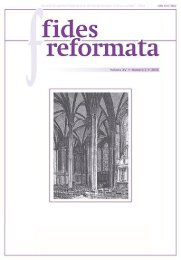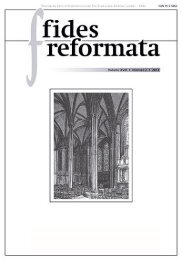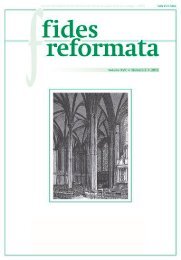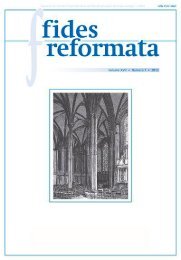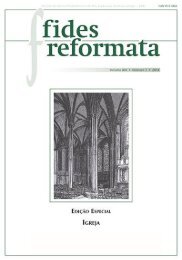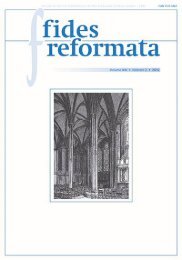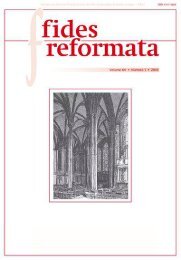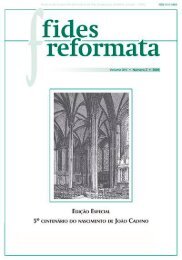Create successful ePaper yourself
Turn your PDF publications into a flip-book with our unique Google optimized e-Paper software.
P.H.R. (Rob) van Houwelingen, John and the Others<br />
and not: ‘... I have recorded’. Compare 1 Maccabees 9:22 – the phrase is not<br />
written at the conclusion of the book but at the conclusion of the part about<br />
Judas Maccabaeus: “Now the rest of the acts of Judas, and his wars and the<br />
brave deeds that he did, and his greatness, have not been recorded, but they<br />
were very many.” (NRSV; also see 1 Maccabees16:23).<br />
The use of “we” in the prologue and the epilogue of the Fourth Gospel<br />
is even more striking. Why is this book enclosed by the first person plural?<br />
And by using that plural, what <strong>do</strong>es the author – who apparently prefers to<br />
conceal himself in his material – want to make clear to his readers? These<br />
questions will be pursued in the present essay, which consists of two parts.<br />
Part 1 deals with the prologue, part 2 with the epilogue of the Gospel of John.<br />
It will be argued that for both passages John, as the last surviving apostle,<br />
was the chief witness, and that there was a group of other eyewitnesses with<br />
him. Thus, the Fourth Gospel is framed by John’s testimony together with that<br />
of his fellow eyewitnesses.<br />
1. “we” in the prologue of the fourth gospel<br />
John 1:14<br />
ὁ λόγος σὰρξ ἐγένετο καὶ ἐσκήνωσεν ἐν ἡμῖν, καὶ ἐθεασάμεθα τὴν δόξαν<br />
αὐτοῦ, δόξαν ὡς μονογενοῦς παρὰ πατρός, πλήρης χάριτος καὶ ἀληθείας.<br />
The Word became a man, a person of flesh and blood; he pitched his<br />
tent among us and we beheld his glory, the glory of the Father’s Only<br />
Begotten, full of grace and truth.<br />
1.1 We beheld<br />
To readers of the Gospel of John it is not immediately clear who are<br />
meant by those who beheld the glory of the incarnate Word. Does “we” exclusively<br />
point to the author, or <strong>do</strong>es it include him and other witnesses, or is<br />
it the author together with the believing readers, the Johannine community?<br />
The text only says what the “we” beheld. This <strong>do</strong>es not concern “witnessing”.<br />
That is mentioned in the next verse about John the Baptist. In fact he would be<br />
the first eyewitness of God revealed in the flesh (1:29-32). Verse 14 remains<br />
ambiguous to its readers. 8<br />
What <strong>do</strong>es John mean precisely with “to behold”? Based on ἐθεασάμεθα<br />
some commentators refer to mystical gazing at a deeper reality. 9 The Greek verb<br />
8 BAUCKHAM, Jesus and the Eyewitnesses, p. 381. From verse 14 a new section of the prologue<br />
begins that reflects on the redemptive historical line in verses 1-13. See WATT, Jan G. van der.<br />
The Composition of the Prologue of John’s Gospel: The Historical Jesus Introducing Divine Grace.<br />
Westminster Theological Journal 57.2 (<strong>19</strong>95), p. 311-332.<br />
9 For instance THYEN, Hartwig. Das Johannesevangelium. HNT. Tübingen: Mohr Siebeck,<br />
2005, p. 95-97.<br />
98





